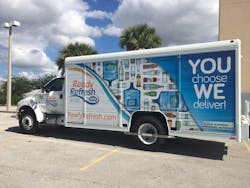Green Fleet of the Month: Nestlé Waters trucks on autogas
Propane autogas is powering nearly a third of the ReadyRefresh by Nestlé beverage delivery trucks in North America. The company plans to have more than half its fleet on autogas by 2019.
Nestlé Waters North America recently added 400 more medium-duty trucks fueled by propane autogas to its continental fleet. That puts the company’s autogas-powered trucks at nearly 600. Nestlé Waters, based in Stamford, CT, is the third largest non-alcoholic beverage company by volume in the U.S.
“Becoming a better steward of our environment is a priority for Nestlé Waters,” said Bill Ardis, national fleet manager for the ReadyRefresh business unit. “We’ve been running propane autogas vehicles since 2014, beginning with five Class 5 vehicles. Based on the proven emissions reduction compared with our older diesel units, and lower fuel and total cost of ownership, we knew this was the right application for us within the alternative fuel space.
“With propane being domestically produced, it’s proven to have a more stable cost per gallon,” he continued, “while the fueling and maintenance infrastructures are much more cost-effective than other alternative fuel options.”
ReadyRefresh’s additional Ford F-650/ 750 delivery trucks are each equipped with a ROUSH CleanTech propane autogas fuel system that provides 55 usable gallons of fuel “without compromising our standard delivery methods,” Ardis added.
The Ford 6.8L V10 3V engine with a ROUSH CleanTech fuel system is certified to 0.05 grams per brake horsepower-hour for nitrogen oxide. According to ROUSH, this engine is 75% cleaner than the current Environmental Protection Agency standard and 99% cleaner than diesel vehicles built before 2007.
“ReadyRefresh’s heavier-duty trucks fueled by propane autogas reduce nitrogen oxide and particulate matter when compared to diesel models,” said Todd Mouw, vice president of sales and marketing for ROUSH CleanTech. “Propane autogas is an affordable, abundant American fuel that allows industry leaders like Nestlé Waters to reduce their operating costs while helping to preserve the environment in which they work.”
Nestlé drivers cite additional benefits that include a quieter engine, powertrain performance equivalent to diesel vehicles, easy fueling, and simple operation.
“Many of our drivers have provided positive feedback for the propane vehicles,” said Robert Austin, director of supply chain for Nestlé Waters North America’s ReadyRefresh business unit. “We are excited about this strategic endeavor that will ultimately drive awareness, efficiency and sustainability. Our new fleet will ensure that ReadyRefresh is poised to meet our consumer’s needs and the delivery of our great brands while improving our environment.”
Propane autogas is the leading alternative fuel in the U.S. and the third most commonly used vehicle fuel—behind gasoline and diesel. More than 90% of the U.S. propane autogas supply is produced domestically; another 7% comes from Canada.
In 2016, Nestlé Waters was recognized within all of Nestlé Worldwide for its commitment to alternative fuel vehicles within the U.S. The company plans to continue to replace older delivery vehicles with propane autogas to reach its goal of operating 52% on the alternative fuel by 2019.
About the Author
Fleet Owner Staff
Our Editorial Team
Kevin Jones, Editorial Director, Commercial Vehicle Group
Cristina Commendatore, Executive Editor
Scott Achelpohl, Managing Editor
Josh Fisher, Senior Editor
Catharine Conway, Digital Editor
Eric Van Egeren, Art Director
